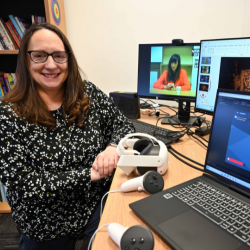-
Study
-
Quick Links
- Course Search
- Fees and Funding
- Unlock Your Potential
- Still time to Apply
- Higher and Degree Apprenticeships
- Continuing Professional Development
- Still time to apply
-
Undergraduate
- UCAS Clearing & Confirmation 2025
- Application Guides
- UCAS Exhibitions
- Foundation Years
- School & College Outreach
- Information for Parents
-
Postgraduate
- Application Guide
- Postgraduate Research Degrees
- Flexible Learning
- Change Direction
- Register your Interest
-
-
International
International
Northumbria’s global footprint touches every continent across the world, through our global partnerships across 17 institutions in 10 countries, to our 277,000 strong alumni community and 150 recruitment partners – we prepare our students for the challenges of tomorrow. Discover more about how to join Northumbria’s global family or our partnerships.
View our Global Footprint-
Quick Links
- Course Search
- Undergraduate Study
- Postgraduate Study
- Information for Parents
- London Campus
- Northumbria Pathway
- Cost of Living
- Sign up for Information
-
International Students
- Information for Students
- International Events
- Application Guide
- Entry Requirements and Education Country Agents
- Global Offices
- English Requirements
- English Language Centre
- International student support
- Cost of Living
-
International Fees and Funding
- International Undergraduate Fees
- International Undergraduate Funding
- International Masters Fees
- International Masters Funding
- International Postgraduate Research Fees
- International Postgraduate Research Funding
-
International Partners
- Agent and Representatives Network
- Global Partnerships
- Global Community
-
International Mobility
- Information for Northumbria Students
- Information for Incoming Exchange Students
-
-
Business
Business
The world is changing faster than ever before. The future is there to be won by organisations who find ways to turn today's possibilities into tomorrows competitive edge. In a connected world, collaboration can be the key to success.
More on our Business Services -
Research
Research
Northumbria is a research-rich, business-focused, professional university with a global reputation for academic quality. We conduct ground-breaking research that is responsive to the science & technology, health & well being, economic and social and arts & cultural needs for the communities
Discover more about our Research -
About Us
-
About Northumbria
- Our Strategy
- Our Staff
- Place and Partnerships
- Leadership & Governance
- Academic Departments
- University Services
- History of Northumbria
- Contact us
- Online Shop
-
-
Alumni
Alumni
Northumbria University is renowned for the calibre of its business-ready graduates. Our alumni network has over 246,000 graduates based in 178 countries worldwide in a range of sectors, our alumni are making a real impact on the world.
Our Alumni - Work For Us
What will I learn on this module?
In this module you will explore the normal anatomy and physiology of the nervous system before applying this knowledge to the altered pathophysiology of acute and chronic neurological conditions. Topics will include traumatic brain injury, brain tumours, stroke, epilepsy, hydrocephalus, Parkinson’s disease, multiple sclerosis and motor neurone disease. You will learn the value and application of comprehensive neurological assessment, investigations and effective management of patients with neurological conditions. The importance and focus of contextualised interprofessional working and the scope of health care provision for neurological conditions within different health care settings will be integral to the module, including the psychological impact on both patients and their families. It is also expected that you apply your new learning to practice (work-based learning) and share experiences with your colleagues.
How will I learn on this module?
This module applies Universal Design for Learning (UDL) principles to remove barriers to learning and create an inclusive, flexible experience that accommodates diverse learning styles. By offering multiple ways to engage with content, varied formats for accessing and understanding material, and ample opportunities for diverse action and expression, you can develop and showcase key employability skills. Through a blend of online resources, and live seminars, the module ensures an active, authentic learning journey that supports your success in real-world contexts (La, Dyjur, & Bair, 2018). This means learning will be via a blended delivery using a combination asynchronous (30 hours of web-based resources) and synchronous (12 hours face-to-face online seminars) learning. A ‘flipped classroom’ approach (Bergman & Sams, 2012), promotes the front loading of theoretical content as preparatory independent study provided via online supported learning (OSL) and reading, prior to the live online seminars where your understanding of concepts and application of theory will be explored. This approach to module delivery promotes active learning as it works to accommodate your learning needs and abilities by offering flexibility and direction gained from the preparatory web-based materials which are then explored and applied during the live online seminars creating new knowledge. Offering multiple ways of learning helps you to engage along with giving you the opportunity to express your learning through action and/or expression. This encourages a positive learning environment where you are likely to feel more engaged and motivated in your learning. Authentic assessment means that any assessments throughout the module will mirror real life activities that you will be faced with in your professional practice. Authentic assessment will be an on-going key feature of the module, via tasks within the web-based materials and online simulated practice learning. These will not only support your learning of the theory related to professional practice but will also support assessment literacy through developing your skills and knowledge of the assessment process. All assessments within the programme will be operated in accordance with standard operating procedures and marked and moderated in accordance with the Assessment Regulations for Taught Awards (ARTA) ensuring the academic standards required for student awards are met.
Bergman, J., & Sams, A. (2012) Flip your classroom. Reach every student in every class every day. Washington D.C., International Science of Technology in Education.
La, H., Dyjur, P., & Bair, H. (2018). Universal design for learning in higher education. Taylor Institute for Teaching and Learning. Calgary University of Calgary
How will I be supported academically on this module?
You will be supported by the module lead who will guide your academic learning and assessment throughout the module. The module lead was involved in developing the e-learning materials, assessment exercises, and will provide some of your live online seminars, and feedback, supported by other staff. This module is supported by Blackboard Ultra and adheres to the university’s minimum standards. The site includes module information, assessment information, power-point presentations and e-learning packages, reading lists and relevant web links. Blackboard Collaborate will be used for the delivery of the live online seminars.
A discussion board is available to the cohort, through which students can post comments and ask questions of their peers throughout the duration of the module. You will have a live online group tutorial will help you prepare for the summative assessment. Your Programme Lead and Personal Tutor are also available to offer guidance on academic support throughout the programme.
The University Libraries offer an extensive collection of material, both hard copy and electronic, access to international databases and training in information retrieval. A variety of study-skills-related help sheets, and online videos can be found on the library Skills Plus site. You can also access a range of student support and wellbeing services via Student Central or by accessing the student support and wellbeing pages and Ask4Help via your electronic student portal
You will also have an allocated personal/guidance teacher who will provide advice and support in relation to academic, procedural, and (where desired and appropriate) personal matters during the programme of study you have enrolled on. You will have access to 24/7 generic IT support and specific support from the programme team with any specific IT issues related to the e-learning package.
What will I be expected to read on this module?
All modules at Northumbria include a range of reading materials that students are expected to engage with. The reading list for this module can be found at: http://readinglists.northumbria.ac.uk
(Reading List service online guide for academic staff this containing contact details for the Reading List team – http://library.northumbria.ac.uk/readinglists)
What will I be expected to achieve?
On completion of this module:
Knowledge & Understanding:
1. You will have understood the principal structures of the nervous system and their physiological function.
2. You will have explored the complex pathophysiology underpinning acute and chronic neurological conditions.
3. You will have examined the management of patients with neurological conditions.
Intellectual / Professional skills abilities:
4. You will have critically analysed the contemporary evidence underpinning the care delivery and management of neurological conditions.
Personal Values Attributes (Global / Cultural awareness, Ethics, Curiosity) (PVA):
5. You will have appreciated the key attributes of complex neurological issues and apply theory to practice settings.
How will I be assessed?
Formative assessments
Formative assessment will take place during scheduled sessions and informed by engagement in learning activities including formal student presentations on a chosen acute and chronic neurological condition. You will have assessment preparation to prepare for this group presentation and it will inform the summative assessment. Feedback will be provided by the module tutor. Formative tests and quizzes will also be embedded within e-learning materials.
(MLO 1-5).
Summative assessment
The summative assessment strategy is designed to ensure that you have the knowledge to recognise and provide appropriate care for patients with a chosen neurological condition. This will be achieved by submission of a 2500-word case study discussing the pathophysiology of the chosen neurological condition, and a critical exploration of the evidence base for its management. Electronic submission will be utilised for the submission of the assignment. Summative feedback on final submission of the assessed work will be given in a structured format to inform future practice (MLO 1-5).
Pre-requisite(s)
To undertake this module, applicants must hold a valid current professional registration (i.e. NMC/GMC/HCPC)
Co-requisite(s)
N/A
Module abstract
The module is aimed at registered health care professionals who care for patients with neurological conditions across all health care settings. It is delivered by academics and clinicians who have expert neurological knowledge and skills. The focus is on the normal anatomy and physiology of the nervous system and an exploration of the altered pathophysiology of acute and chronic neurological conditions, including traumatic brain injury, brain tumours, hydrocephalus, stroke, epilepsy, Parkinson’s disease, motor neurone disease and multiple sclerosis. You will develop knowledge and understanding of the care and treatment of these conditions including assessment, investigations, and treatment. The module integrates the importance of inter-professional working and the scope of health care provision for neurological conditions, including the psychological impact on patients and their families. The assessment is based on your developing knowledge and understanding of a chosen acute or chronic neurological condition resulting in of a 3000-word case study which will enable you to demonstrate the achievement of the module learning outcomes. This module is available at level 6 but can also be undertaken at Level 7.
Course info
Credits 20
Level of Study NotDefined
Mode of Study 1 year Part Time
Department Nursing, Midwifery & Health
Location Coach Lane Campus, Northumbria University
City Newcastle
Start September 2025
Study at Northumbria
- Neurodiversity and Inclusive Practice MA
- Neurodiversity and Inclusive Practice MA
- Forensic Psychology MSc
- Tourism and Visitor Economy MSc
- Automotive Engineering (Extended Degree) BEng (Hons)
- Architecture (Extended Degree) BA (Hons)
- Business Management (Extended Degree) BA (Hons)
- Digital Design (Extended Degree) BA (Hons)
- English Language and Literature (Extended Degree) BA (Hons)
- English Language (Extended Degree) BA (Hons)
- English Literature and American Studies (Extended Degree) BA (Hons)
- English Literature and History (Extended Degree) BA (Hons)
- English Literature (Extended Degree) BA (Hons)
- Fashion Business (Top-Up) BA (Hons)
- Fashion Communication (Extended Degree) BA (Hons)
- Fashion Design and Marketing (Extended Degree) BA (Hons)
- Fashion (Extended Degree) BA (Hons)
- Film (Extended Degree) BA (Hons)
- Fine Art (Extended Degree) BA (Hons)
- Furniture and Product Design (Extended Degree) BA (Hons)
- Graphic Design (Extended Degree) BA (Hons)
- History and American Studies (Extended Degree) BA (Hons)
- Interior Design (Extended Degree) BA (Hons)
- International Relations and Politics (Extended Degree) BA (Hons)
- Marketing (Extended Degree) BA (Hons)
- Media and Communication (Extended Degree) BA (Hons)
- Music (Extended Degree) BA (Hons)
- Product Design (Extended Degree) BA (Hons)
- Theatre and Performance (Extended Degree) BA (Hons)
- Tourism and Events Management (Extended Degree) BA (Hons)
- Civil Engineering (Extended Degree) BEng (Hons)
- Mechanical Engineering (Extended Degree) BEng (Hons)
- Biochemistry (Extended Degree) BSc (Hons)
- Biomedical Science (Extended Degree) BSc (Hons)
- Building Surveying (Extended Degree) BSc (Hons)
- Business and Analytics (Extended Degree) BSc (Hons)
- Chemistry (Extended Degree) BSc (Hons)
- Computer Science (Extended Degree) BSc (Hons)
- Computing (Top-Up) BSc (Hons)
- Criminology and Forensic Science (Extended Degree) BSc
- Criminology (Extended Degree) BSc (Hons)
- Data Science (Extended Degree) BSc (Hons)
- Economics and Finance (Extended Degree) BSc (Hons)
- Economics (Extended Degree) BSc (Hons)
- Finance and Investment Management (Extended Degree) BSc (Hons)
- Food Science and Nutrition (Extended Degree) BSc (Hons)
- Football Coaching and Performance (Extended Degree) BSc (Hons)
- Football Coaching and Performance BSc (Hons)
- Forensic Science (Extended Degree) BSc (Hons)
- Games Computing (Extended Degree) BSc (Hons)
- International Business Management (Extended Degree) BSc (Hons)
- Mathematics (Extended Degree) BSc (Hons)
- Physics (Extended Degree) BSc (Hons)
- Physics with Astrophysics (Extended Degree) BSc (Hons)
- Sociology (Extended Degree) BSc (Hons)
- Sport and Exercise Science (Extended Degree) BSc (Hons)
- Sport Coaching (Extended Degree) BSc (Hons)
- Sport, Exercise and Nutrition (Extended Degree) BSc (Hons)
- Sport Management (Extended Degree) BSc (Hons)
- English Literature and Creative Writing (Extended Degree) BA (Hons)
- Nursing Associate Apprenticeship | Foundation Degree in Science (FdSc) | Northumbria University
- Nursing Associate FdSc
- Neurodiversity and Inclusive Practice MA
- English Language BA (Hons)
- History (Extended Degree) BA (Hons)
- Accounting (Extended Degree) BSc (Hons)
- Industrial Design MA MSc
- International Business Management MSc
- Global Development MSc
- Global Development MSc
- Global Development MSc
- Healthcare Leadership and Management MSc
- Responsible Innovation MA
- Spatial and Environmental Design MA
- Fashion Design and Marketing BA (Hons)
- Product Design BA (Hons)
- Police Constable Degree Apprenticeship | Northumbria Police
- Police Constable Degree Apprenticeship | Durham Constabulary
- Communication Design MA
- Fashion Design MA
- Sustainable and Ethical Fashion MA
- Design Foundation Year
- Fashion Communication BA (Hons)
- Digital Design BA (Hons)
- Furniture and Product Design BA (Hons)
- Fashion BA (Hons)
- Interior Design BA (Hons)
- Graphic Design BA (Hons)
- Digital and Technology Solutions - Business Analyst | Degree Apprenticeship | QA
- Digital and Technology Solutions – Computing Data Analyst | Degree Apprenticeship | QA
- MSc Advanced Clinical Practitioner - Degree Apprenticeship
- Digital and Technology Solutions – Cyber Security | Degree Apprenticeship | QA
- Digital and Technology Solutions – IT Consultant | Degree Apprenticeship | QA
- Law (Space Law) LLM
- Digital and Technology Solutions – Network Engineer | Degree Apprenticeship | QA
- Law LLB (Hons)
- Digital and Technology Solutions – Software Engineer | Degree Apprenticeship | QA
- Sleep and Chronobiology MRes
- Financial Mathematics BSc (Hons)
- Eye Movement Desensitisation & Reprocessing (EMDR) Therapy - Postgraduate Certificate
- Pre-sessional English Language and Study Skills
- Pre-sessional English Language and Study Skills
- Pre-sessional English Language and Study Skills
- Law (Cyber Law) LLM
- Community Specialist Practitioner (Adult Social Care Nursing) Postgraduate Diploma
- Community Specialist Practitioner (Adult Social Care Nursing) Postgraduate Diploma
- Community Specialist Practitioner (Children's Nursing) Postgraduate Diploma
- Community Specialist Practitioner (Children's Nursing) Postgraduate Diploma
- Community Specialist Practitioner (District Nursing) Postgraduate Diploma
- Community Specialist Practitioner (District Nursing) Postgraduate Diploma
- Community Specialist Practitioner (General Practice Nursing) Postgraduate Diploma
- Community Specialist Practitioner (General Practice Nursing) Postgraduate Diploma
- Cyber Security MSc (London)
- Cyber Security Technology MSc (London)
- Specialist Community Public Health Nursing (Health Visiting) Postgraduate Diploma
- Healthcare Leadership and Management MSc
- Specialist Community Public Health Nursing (Health Visiting) Postgraduate Diploma
- Healthcare Leadership and Management MSc
- Specialist Community Public Health Nursing (School Nursing) Postgraduate Diploma
- Specialist Community Public Health Nursing (School Nursing) Postgraduate Diploma
- Business Analytics MSc
- Finance MSc
- International Finance and Investment MSc
- Digital and Immersive Arts MA
- Marketing MSc
- BSC (HONS) GLOBAL BUSINESS MANAGEMENT (HUMAN RESOURCES) (SINGAPORE)
- Global Logistics, Operations and Supply Chain Management MSc
- International Business Management MSc
- BSC (HONS) GLOBAL BUSINESS MANAGEMENT (LOGISTICS AND SUPPLY CHAIN) COMPLETION AWARD (SINGAPORE)
- Leading Positive Behavioural Support in Organisations - Advanced Diploma
- Specialist Community Public Health Nursing (School Nursing) Higher Apprenticeship | Northumbria University
- Specialist Community Public Health Nursing (Health Visiting) Higher Apprenticeship
- Leading Positive Behavioural Support in Organisations - Postgraduate Certificate
- Social Work BSc (Hons)
- Community Specialist Practitioner Higher Apprenticeship
- Real Estate MSc with Advanced Practice
- BSC (HONS) INTERNATIONAL TOURISM, HOSPITALITY AND EVENTS COMPLETION AWARD (SINGAPORE)
- Business and Entrepreneurship BA (Hons)
- Film BA (Hons)
- Fine Art BA (Hons)
- Media and Communication BA (Hons)
- Electrical and Electronic Engineering BEng (Hons)
- Business and Analytics BSc (Hons)
- Health and Social Practice (Clinical) BSc
- Health and Social Practice BSc
- Health and Social Practice (Education) BSc
- Health and Social Practice (Leadership and Management) BSc
- Film, Media, Theatre and Performance Foundation Year
- Sport Foundation Year (i2i International Soccer Academy)
- Health and Social Practice Graduate Certificate
- Conservation of Fine Art (Easel Paintings) MA
- Conservation of Fine Art (Works of Art on Paper) MA
- Electrical and Electronic Engineering MEng (Hons)
- Health and Social Practice (Clinical) MSc
- Health and Social Practice MSc
- Health and Social Practice (Education) MSc
- Health and Social Practice (Leadership and Management) MSc
- International Hospitality and Tourism Management MSc
- Teacher Training in School PGCE
- Senior People Professional Higher Apprenticeship
- Business and Human Resource Management BA (Hons)
- Business and Supply Chain Management BA (Hons)
- Business Management BA (Hons)
- Doctor of Sport
- Doctor of Sport
- Theatre and Performance BA (Hons)
- Tourism and Events Management BA (Hons)
- Automotive Engineering BEng (Hons)
- Mechanical Engineering BEng (Hons)
- Accounting and Finance (Top-Up) BSc (Hons)
- Accounting and Finance (Top-Up) BSc (Hons)
- Accounting BSc (Hons)
- Master of Public Health (Palliative and End-of-Life Care)
- Global Business Management (Marketing) (Top-Up) BSc (Hons)
- Master of Public Health (Palliative and End-of-Life Care)
- Global Business Management (Top-Up) BSc (Hons)
- Health and Social Care BSc (Hons)
- International Business Management BSc (Hons)
- Occupational Therapist Degree Apprenticeship | Occupational Therapy BSc (Hons)
- Operating Department Practitioner Degree Apprenticeship | Operating Department Practice BSc (Hons)
- Operating Department Practice BSc (Hons)
- Construction Quantity Surveyor Degree Apprenticeship | Quantity Surveying (Construction) BSc (Hons)
- Chartered Surveyor Degree Apprenticeship | Quantity Surveying BSc (Hons)
- Sport and Exercise Science BSc (Hons) (i2i International Soccer Academy)
- Sport and Exercise Science BSc (Hons)
- Sport Coaching BSc (Hons) (i2i International Soccer Academy)
- Sport Coaching BSc (Hons)
- Sport, Exercise and Nutrition BSc (Hons) (i2i International Soccer Academy)
- Sport, Exercise and Nutrition BSc (Hons)
- Sport Management BSc (Hons) (i2i International Soccer Academy)
- Creative and Cultural Industries Management MA
- Sport Management BSc (Hons)
- Creative Writing MA
- Creative Writing MA
- Criminology BSc (Hons)
- Business and Marketing BA (Hons)
- Criminology and Criminal Justice MA
- Criminology and Criminal Justice MA
- Global Sustainable Business Management MSc
- Doctorate of Design
- Criminology and Forensic Science BSc (Hons)
- Criminology and Sociology BSc (Hons)
- Doctorate of Design
- Cyber Security MSc (London)
- Economics BSc (Hons)
- Cyber Security MSc (London)
- Education MA
- Data Protection Law and Information Governance Postgraduate Certificate
- Design MRes
- Finance and Investment Management BSc (Hons)
- Design MRes
- Digital Marketing MSc (London)
- Digital Marketing MSc
- Health, Education and Social Care Foundation Year
- Digital Marketing (with Advanced Practice) MSc (London)
- Disaster Management and Sustainable Development MSc
- Disaster Management and Sustainable Development MSc
- Doctor of Philosophy (PhD)
- International Banking and Finance (Top-Up) BSc (Hons)
- Electrical Power Engineering MSc
- Electrical Power Engineering MSc
- Creative and Cultural Industries Management MA
- English Language and Literature BA (Hons)
- English Literature MA
- English Literature MA
- English Literature MA
- English Literature MA
- English Literature MRes
- English Literature and Creative Writing BA (Hons)
- English Literature and History BA (Hons)
- English Literature BA (Hons)
- English Literature MRes
- Environmental Science BSc (Hons)
- Food Science and Nutrition BSc (Hons)
- Forensic Accounting MSc
- Forensic Science MSc
- Forensic Science MSc
- Forensic Science BSc (Hons)
- Education (Leadership and Management) MA
- Education (SEND Inclusion) MA
- Geography BA (Hons)
- Geography BSc (Hons)
- Education (Teaching and Learning) MA
- Guidance and Counselling BA (Hons)
- Health Psychology MSc
- Health Psychology MSc
- Marketing BA (Hons)
- History MA
- History MRes
- History MA
- History MRes
- History and Politics BA (Hons)
- History BA (Hons)
- History MA
- History MA
- Humanities Foundation Year
- Interior Architecture Postgraduate Certificate
- International Business Management MSc
- Sport Performance and Analysis MSc
- Strength and Conditioning MSc
- Strength and Conditioning MSc
- Mathematics, Physics, and Electrical Engineering Foundation Year
- Mechanical and Civil Engineering Foundation Year
- International Finance and Investment MSc
- Four Year Doctor of Medicine (MD4)
- Automotive Engineering MEng (Hons)
- International Relations and Politics BA (Hons)
- Cyber Security (with Advanced Practice) MSc (London)
- LLM Law (International Criminal Law and Practice)
- Mechanical Engineering MEng (Hons)
- International Sport Management MSc
- Law Foundation Year
- Midwifery Studies BSc (Hons)
- Business with Financial Management MSc (London)
- LLM Professional Legal Practice
- Big Data and Data Science Technology MSc (London)
- Business and Management BA (Hons) Top Up
- Big Data and Data Science Technology (with Advanced Practice) MSc (London)
- Business and Management MSc
- Business and Management MSc
- Business and Management MSc
- Business and Management MSc
- Clinical Exercise Physiology MSc
- Clinical Exercise Physiology MSc
- Computer Science with Artificial Intelligence MSc
- Computer Science with Data Analytics MSc
- Data Science MSc
- Digital Marketing MSc
- Entrepreneurship and Innovation Management MSc
- Entrepreneurship and Innovation Management MSc
- Master of Public Health
- Mathematics BSc (Hons)
- Mathematics MMath (Hons)
- Global Logistics Operations and Supply Chain Management MSc (London)
- Global Logistics Operations and Supply Chain Management MSc (London)
- Mathematics MSc
- Midwifery Studies MSc
- Occupational and Organisational Psychology MSc
- Occupational Therapy (Pre-Registration) MSc
- Psychology MSc
- Mental Health Law and Practice Certificate
- Microbiology MSc
- Microbiology MSc
- Microelectronic and Communications Engineering MSc
- Microelectronic and Communications Engineering MSc
- Microelectronic and Communications Engineering MSc
- Business with Entrepreneurship MSc (London)
- Sport and Exercise Nutrition MSc
- Sport and Exercise Nutrition MSc
- Sport Performance and Analysis MSc
- Web & Mobile Development Technologies MSc (London)
- Business with Marketing Management MSc (London)
- Electrical Power Engineering MSc
- NEBOSH National General Certificate in Occupational Health and Safety (Distance Learning)
- NEBOSH National General Certificate in Occupational Health and Safety (Part-Time)
- NEBOSH National Diploma in Occupational Health and Safety (Distance Learning mode)
- NEBOSH National Diploma in Occupational Health and Safety (Part-Time)
- Nursing Science BSc (Hons)
- Occupational Therapy BSc (Hons)
- Nutritional Science MSc
- Nutritional Science MSc
- Occupational and Organisational Psychology MSc
- Occupational and Organisational Psychology MSc
- Physical Geography BSc (Hons)
- Physics BSc (Hons)
- Physics MPhys (Hons)
- Physics with Astrophysics BSc (Hons)
- Physics with Astrophysics MPhys (Hons)
- Physiotherapy BSc (Hons)
- Primary Education BA (Hons)
- Professional Practice in Mental Health Law Postgraduate Certificate
- Project Management MSc
- Project Management MSc
- Project Management MSc
- Psychology MRes
- Law (International Commercial Law) LLM
- Psychology MSc
- Law (Space Law) LLM
- Master of Public Health
- Medical Law Postgraduate Certificate
- Healthcare Professional Practice MRes
- Master of Public Health
- Quantity Surveying BSc (Hons)
- Advanced Computer Science MSc
- Real Estate BSc (Hons)
- Real Estate MSc
- Computing and Technology (with Advanced Practice) MSc (London)
- Social Science Foundation Year
- Cyber Security Technology (with Advanced Practice) MSc (London)
- Sociology BSc (Hons)
- Web and Mobile Development Technologies MSc
- Sport and Exercise Psychology MSc
- Bar Course LLM
- Sport and Exercise Psychology MSc
- Advanced Computer Science MSc
- Professional Doctorate in Health, Education and Society
- Advanced Computer Science MSc
- Senior Leader Higher Apprenticeship
- Artificial Intelligence MSc
- Business with Business Analytics MSc (London)
- Social Work MA
- Business with Business Analytics (with Advanced Practice) MSc (London)
- Business with Hospitality and Tourism Management MSc (London)
- Sport Foundation Year
- Accounting, Finance and Economics Foundation Year
- Business with Hospitality and Tourism Management (with Advanced Practice) MSc (London)
- Master in Computer Science Course | Northumbria
- English Literature and American Studies BA (Hons)
- Computer Science MSc
- History and American Studies BA (Hons)
- Computer Science MSc
- Interior Architecture BA (Hons)
- Computing and Technology MSc (London)
- Music BA (Hons)
- Computing and Technology (Part-Time) MSc (London)
- Bar Course
- Cyber Security Technology MSc (London)
- Bar Course
- Cyber Security Technology (Part-Time) MSc (London)
- Bar Knowledge Course
- Finance MSc
- Bar Skills Course
- Civil Engineer Degree Apprenticeship | Civil Engineering BEng (Hons)
- Information Security Management MSc (London)
- Biochemistry BSc (Hons)
- International Project Management MSc (London)
- International Project Management (with Advanced Practice) MSc (London)
- Marketing MSc
- Nursing Science Registered Nurse (Adult) MSc
- Registered Nurse Degree Apprenticeship | Nursing Science/ Registered Nurse (Adult) BSc (Hons)
- Nursing Science Registered Nurse (Adult) BSc (Hons)
- Nursing Science Registered Nurse (Mental Health) MSc
- Registered Nurse Degree Apprenticeship | Nursing Science/ Registered Nurse (Child) BSc (Hons)
- Psychology MSc
- Nursing Science Registered Nurse (Child) BSc (Hons)
- Surveying (Building Surveying) MSc
- Nursing Science Registered Nurse (Learning Disabilities) BSc (Hons)
- Surveying (Quantity Surveying) MSc
- Surveying (Real Estate) MSc
- Music Foundation Year
- Nursing Science Registered Nurse (Mental Health) BSc (Hons)
- Psychology with Criminology BSc (Hons)
- Occupational Psychology Professional Doctorate
- Professional Policing BSc (Hons)
- Business and Management Foundation Year
- Psychology BSc (Hons)
- Data Science MSc
- Psychology MSc
- Data Science MSc
- Psychology Foundation Year
- Data Science MSc
- American Studies BA (Hons)
- Digital Tech | Digital and Technology Solutions Specialist MSc
- Applied Linguistics for TESOL MA
- Doctor of Business Administration (DBA)
- Applied Linguistics for TESOL MA
- Doctor of Business Administration (DBA) Part-time
- Applied Sciences Foundation Year
- Architecture BA (Hons)
- Education Leadership in Learning (Teach First) MA
- Architecture MArch
- Fine Art Foundation Year
- Arts MRes
- Geography and Environmental Sciences Foundation Year
- Arts MRes
- International Relations, Conflict and Security MA
- Biology BSc (Hons)
- International Relations, Conflict and Security MA
- Biomedical Science BSc (Hons)
- International Relations, Conflict and Security MA
- Biomedical Science BSc (Hons)
- Biotechnology MSc
- Biotechnology MSc
- Building Surveying BSc (Hons)
- Architecture and Built Environment Foundation Year
- Education (Teaching and Learning) MA
- Business Enterprise, Creation and Management BA (Hons) (London Campus)
- Business with Financial Management (with Advanced Practice) MSc (London)
- Business with Human Resource Management MSc (London)
- Architect Degree Apprenticeship | MArch
- Business with Human Resource Management (with Advanced Practice) MSc (London)
- Luxury Brand Management MA (London)
- Chartered Manager Degree Apprenticeship | Business Leadership and Management Practice BA (Hons)
- Luxury Brand Management (with Advanced Practice) MA (London)
- Business with Entrepreneurship (with Advanced Practice) MSc (London)
- Bar Course LLM
- Business with International Management MSc (London)
- Law (Criminal Justice) LLM
- Business with International Management (with Advanced Practice) MSc (London)
- Law (Cyber Law) LLM
- Business with Marketing Management (with Advanced Practice) MSc (London)
- Chemistry BSc (Hons)
- Chemistry MChem
- Childhood and Early Years Studies BA (Hons)
- Civil Engineering BEng (Hons)
- Civil Engineering MEng (Hons)
- Computing and Information Technology Foundation Year
- Construction Project Management with BIM MSc
- Construction Project Management with BIM MSc
- Construction Project Management with BIM MSc
- Preventive Conservation MA
- Preventive Conservation MA
All information is accurate at the time of sharing.
Full time Courses are primarily delivered via on-campus face to face learning but could include elements of online learning. Most courses run as planned and as promoted on our website and via our marketing materials, but if there are any substantial changes (as determined by the Competition and Markets Authority) to a course or there is the potential that course may be withdrawn, we will notify all affected applicants as soon as possible with advice and guidance regarding their options. It is also important to be aware that optional modules listed on course pages may be subject to change depending on uptake numbers each year.
Contact time is subject to increase or decrease in line with possible restrictions imposed by the government or the University in the interest of maintaining the health and safety and wellbeing of students, staff, and visitors if this is deemed necessary in future.
Useful Links
Find out about our distinctive approach at
www.northumbria.ac.uk/exp
Admissions Terms and Conditions
northumbria.ac.uk/terms
Fees and Funding
northumbria.ac.uk/fees
Admissions Policy
northumbria.ac.uk/adpolicy
Admissions Complaints Policy
northumbria.ac.uk/complaints









